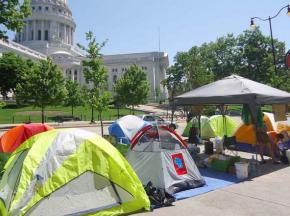The return to the Capitol
reports from Madison, where activists are kicking off a week of protests and events that they hope will bring the movement back into the streets.
SINCE THE subsiding of the mass demonstrations that engulfed the Wisconsin capital of Madison in February and early March, people have been asking when--and if--they would return. This weekend, activists have taken the first critical steps toward reviving them.
On Saturday, more than 100 people began camping out on the sidewalks along the Capitol Square in an emergent tent city that activists call Walkerville. The tent city is named for Wisconsin Gov. Scott Walker, author of the union-busting legislation that spurred the protests earlier this year. This Tuesday, Walker's slash-and-burn state budget proposals will move toward passage in a Republican-controlled legislature.
Last Thursday and Friday, the legislature's Joint Finance Committee held hearings on the budget proposal, and demonstrations organized by Voces de la Frontera and other organizations disrupted them for several hours on each day.
One critical issue in the budget proposal is a provision that would end in-state tuition for the undocumented at state universities and colleges. In spite of requests from Democrats to call off the protest and focus on coming recall elections, members of Voces and other supporters made their stand, reading statements to the committee. Those who protested were removed from the hearing--several were arrested on each day.

Much of the stress since early March when Walker rammed through his anti-labor law has been on recall elections for Republican lawmakers--but those are still a month away.
Now, with the support of major state and local unions, Walkerville has a city permit for 24 days to act as a base camp for a series of actions aimed at refocusing public attention on the budget and bringing the movement back into the streets.
For activists, there is a shared feeling that we've been waiting for this. As Molly Noble of the Teaching Assistants' Association at the University of Wisconsin put it, "This is our reunion."
The sense of community that took shape in February has been sorely missed by many of us--and as the tent city went up on Saturday, it appeared even stronger in anticipation for the fight to come.
Noble pointed out that there were two parallel tracks of opposition being followed. One is electoral--six Republican state legislators will face a recall election in July. But there are many questions surrounding this strategy, and they will undoubtedly be a point of conversation throughout the month.
The other strategy is perfectly clear: Build public displays of opposition. "I want to see a thousands tents out here," Noble exclaimed.
THE RECALL effort will obviously come too late to stop Walker's budget assault, but the uncertainty around this strategy is about more than timing.
Many activists participating in the coming days of protest in Madison are rightfully concerned with a political message that has been narrowly focused on collective bargaining rights for public-sector unions. These are obviously very important, but broader issues are being neglected--including wage and benefit concessions imposed on public-sector workers, not to mention Walker's predatory attacks on education, health care, pensions and the environment.
And what is the movement asking of the Democrats who would replace the recalled Republicans? That question has been conspicuously absent from the official dialogue.
So there's no doubt that as Walkerville grows, so too will the discussions and debates about such questions.
Harriet Rowen, one of the architects of the Info Center at the Capitol in February and now an organizer for Walkerville's Info Center, argues that we aren't just here in opposition to Walker's budget, but in support of a fair and just alternative.
To highlight this aim, a coalition of unionists and community activists have called for a mass action on Monday, with the backing of the firefighters union, farmers, nurses and others--to build support for a budget for people's rights, including a progressive tax system, a living wage, affordable health care, collective bargaining rights, quality public education, protection of the environment, access to food and quality housing, a secure retirement, and strong supports for human, civil and immigrant rights.
Walkerville will support this alternative vision by dedicating each day of the following week to a different theme. Sunday's was K-12 Education Day--next will be Public Services Day, Health Care Day, Higher Education Day, Democracy and Corporate Power Day, ending with Fightback Friday.
Though we're confident that the public is behind us, Rowen is right to say that we need more work on outreach and raising people's awareness of what's in Walker's budget. "Walkerville is a base camp of resistance," she said. "It's a safe space where people can join to express their disapproval." And for it to be a success in stopping those attacks, it will have to grow.
The scene at Walkerville late into Saturday night and on Sunday morning was festive. People gathered and in many cases did reunite after having gone separate ways after February. We passed out flyers for Monday's action, engaging with people who passed by. Most of the responses we got were positive.
Though we did get into a few arguments and minor altercations with intoxicated conservatives, there were many more people thanking us for being out there--and who were enthusiastic about the street movement returning to Madison.
When asked what we should expect for Walkerville and the upcoming actions, activists at the tent city gave had numerous responses--all positive and thoughtful. We know that the struggle ahead of us is going to require large numbers of people in the street, and we don't have that right now. But we've resolved to hold this ground as long as we can--and expand it. And we have what may be the most important element of all--a feeling that we can succeed.


